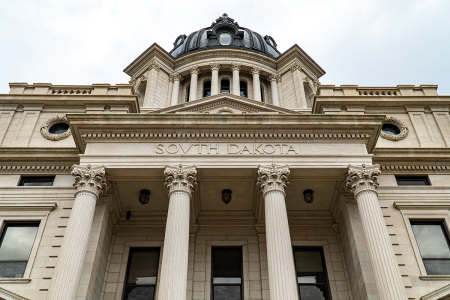First pro-life 'Med Ed' bill in the nation passes South Dakota House

A bill designed to give doctors information about the state’s pro-life law and how it applies to other members of the medical community is one step closer to becoming law as pro-lifers continue to combat what they view as efforts to deliberately mislead voters about their state’s abortion laws.
The Republican-controlled South Dakota House of Representatives passed House Bill 1224 in a 63-6 vote Wednesday. For the most part, the vote came down along party lines. All but one Republican voted in favor of the measure, while all but one Democrat opposed it. While a second House Democrat sponsored the bill, he was absent from Wednesday’s vote.
HB 1224 is defined as “An Act to require the creation of an informational video and other materials describing the state’s abortion law and medical care for a pregnant woman experiencing life-threatening or health-threatening medical conditions.” The measure authorizes the South Dakota Department of Health to “create a video and other materials” to describe, among other things, “the state’s abortion law and acts that do and do not constitute an abortion.”
The video mandated by the bill will also outline “the most common medical conditions that threaten the life or health of a pregnant woman” and “the generally accepted standards of care applicable to the treatment of a pregnant woman experiencing life-threatening or health-threatening medical conditions.”
The video will also list “the criteria that a practitioner, exercising reasonable medical judgment, might use in determining the best course of treatment for a pregnant woman experiencing life-threatening or health-threatening medical conditions for her and for her unborn child.”
If approved by the Republican-controlled state Senate and South Dakota’s Republican Gov. Kristi Noem, the South Dakota Department of Health would have until Sept. 1 to create the video and post it on its website.
Kelsey Pritchard, the state public affairs director for the pro-life group Susan B. Anthony Pro-Life America, released a statement praising the South Dakota House for “showing the rest of the nation how to protect women’s lives by making it abundantly clear that pregnant women can and must receive timely emergency care under [pro-life laws].”
She added: “Abortion activists have sown confusion on this point around the nation to justify their agenda for no limits on abortion. This lie not only deceives but puts women in danger, and a Med Ed Policy is the solution.”
The pro-life group further noted that the bill "is the first legislation of its kind drafted to end the confusion caused by the abortion industry through direct education to medical professionals." Other states that provided similar guidance include Louisiana, Oklahoma and Kentucky.
The South Dakota Legislature’s effort to pass the Med Ed bill comes as states have passed restrictions on abortion following the U.S. Supreme Court’s decision in Dobbs v. Jackson Women’s Health Organization that determined that the U.S. Constitution does not contain a right to abortion. The Dobbs decision reversed the 1973 Roe v. Wade ruling that legalized abortion nationwide and prevented states from implementing total bans on abortion.
South Dakota is one of 15 states that prohibit abortions throughout all nine months of pregnancy, although the state’s abortion law does contain exceptions in cases where the pregnant woman is facing a medical emergency.
Pro-abortion advocates have claimed that pro-life laws passed at the state level put women in danger and leave them unable to receive treatment for miscarriages and ectopic pregnancies. States dispute this, however.
While South Dakota’s Med Ed bill constitutes the first attempt of a state government to address these claims, pro-life groups began refuting such allegations in the weeks following the Dobbs decision.
In 2022, the American Association of Pro-Life Obstetricians and Gynecologists (AAPLOG) released a fact sheet titled “Myth vs. Fact: Correcting Misinformation on Maternal Medical Care.” The pro-life organization took issue with the warning that “women with ectopic pregnancies and miscarriages won’t receive care they need,” stressing that “the difference between a miscarriage and an elective abortion is clear.”
According to the fact sheet, “In a miscarriage, the baby has already died, and therefore, any treatment of a miscarriage would not be an abortion. The procedures and treatments used for miscarriage management are not prohibited by abortion restrictions.”
As for concerns that pro-life laws will impact women’s ability to receive treatment for ectopic pregnancies, the AAPLOG asserted that “an ectopic pregnancy requires removing an embryo to save a mother’s life so that both lives are not lost.” The group stressed that “this life-saving treatment is not prevented by any current law restricting abortion.”
Ryan Foley is a reporter for The Christian Post. He can be reached at: ryan.foley@christianpost.com





















